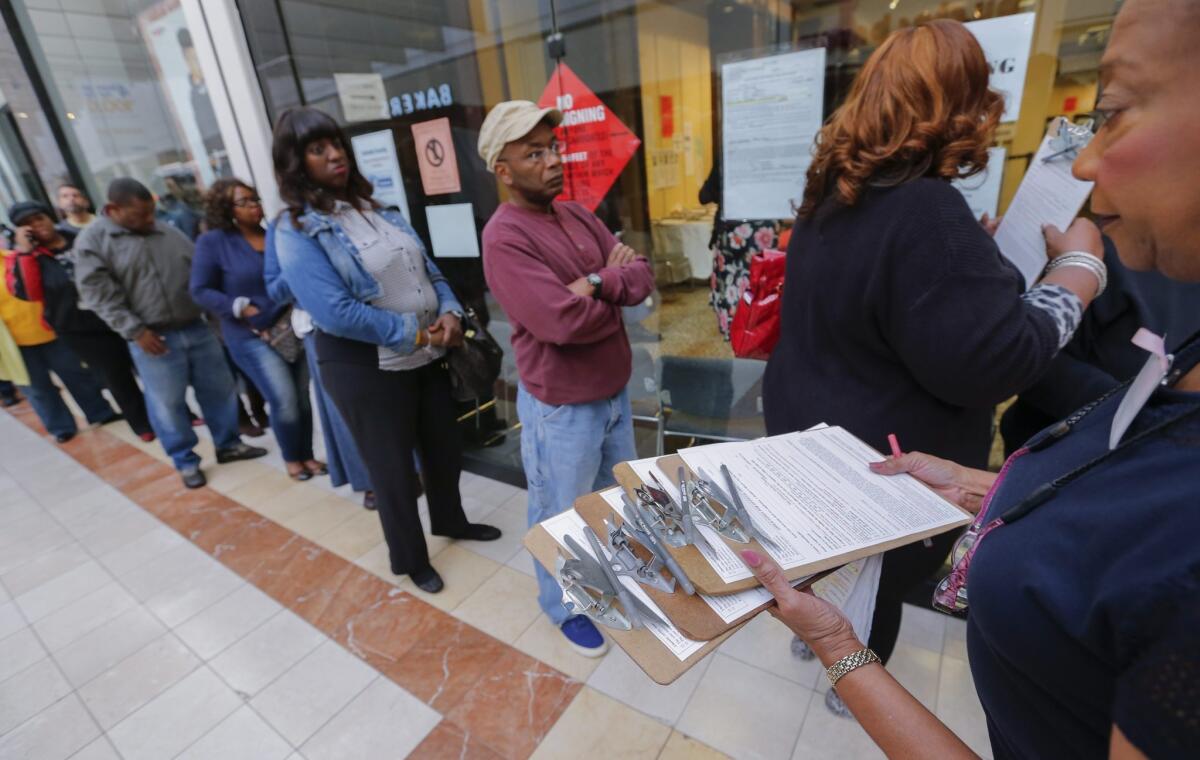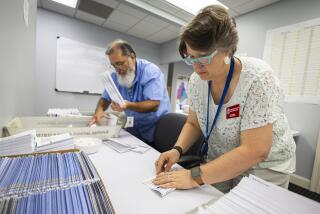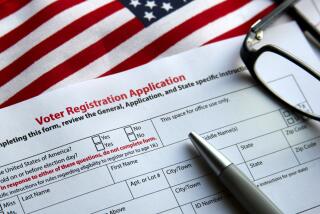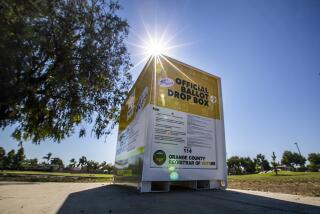Today’s voting freakout: noncitizens are coming to steal your election

- Share via
With only a few days left before election day, pretexts for panic over the sanctity of the ballot box are dwindling down to a precious few. Two political scientists from Virginia’s Old Dominion University have done their part, with an article on the Washington Post’s Monkey Cage politics website asserting that control of the Senate could be “decided by illegal votes cast by non-citizens” on Tuesday.
The column by Jesse Richman and David Earnest is based on their longer paper in the journal Electoral Studies. Their methodology already has been challenged by other political scientists who argue that Richman’s and Earnest’s statistical sample doesn’t warrant their conclusions.
That hasn’t kept some right-wing pundits from using it as a justification for the wholesale restrictions on voting imposed by Republican state governments across the nation. That’s because the Old Dominion researchers conclude that the noncitizens at issue tend to skew Democratic. Breitbart.com’s headline was “Study: Voting by non-citizens tips balance for Democrats.” RedState’s was “Study: Illegal votes can determine elections; Voter ID not sufficient.”
Keep your eye on that RedState headline for a clue to how the study, as meager as it is, will be misused in the voter ID wars. What Richman and Earnest say isn’t that Voter ID is “not sufficient”; they say it’s not effective. In fact, they call it “strikingly ineffective” at stemming non-citizen voting.
But even that begs the question of whether noncitizen voting is a problem. The academic critics of Richman and Earnest, who include Paul Gronke of Reed College, John Ahlquist and Scott Gehlbach of the University of Wisconsin, and Rick Hasen and Michael Tesler of UC Irvine express doubts that they made their case. In essence, they regard the authors’ assertion that the 2008 Senate victory of Al Franken (D-Minn.) and of President Obama in North Carolina, were close enough to have been swung by the votes of noncitizens in those states as a massive overreach.
The problem is that the Cooperative Congressional Election Study database used by the authors, while large, is known to be riddled with errors. It’s a poll conducted by the private firm YouGov (not Congress) of Internet respondents. Critics say it’s weak in determining citizenship, and in eliciting accurate responses from supposed noncitizens about their voter registration and voting habits. (Many respondents say they’re registered U.S. voters but aren’t.)
Ahlquist and Gehlbach observe that the sample of non-citizens is a tiny 1%. As a result, the sample of those claiming to be noncitizen voters is infinitesimal. In the 2008 poll, Richman and Earnest found only five noncitizen voters out of 32,800 claiming to have cast a validated vote, and in the 2010 study, only 13 out of 55,400 respondents. Given the potential rate of error, Ahlquist and Gehlbach say, “it takes a bit of hubris to draw strong conclusions about the behavior of non-citizens from such small numbers.”
As it happens, Richman has already backed off his eye-catching conclusion about the potential for noncitizens affecting the Senate. “Noncitizen voting might tip one or two extremely close races but is unlikely to tip the balance in the Senate, and certainly not in the House,” he told the Reno Gazette-Journal. He acknowledged that his research is preliminary: “We are at the very beginning of the process. Colleagues have raised reasonable questions about the data we used--problems that we acknowledge in both the study and the Monkey Cage.”
Indeed, the best empirical evidence so far indicates that the real threat to the sanctity of the vote is coming from efforts to deny voting rights to legitimate voters. These include the frightening and insidious Interstate Crosscheck campaign implemented in 27 states, mostly Republican, documented by Greg Palast. Those desperate to suppress the votes of minority and low-income voters wring their hands over the infinitesimal chance that a noncitizen might cast a vote; the real, deliberate effort to deny voting rights to hundreds of thousands of voters at a time--the case in Wisconsin, Texas, and other states, as Supreme Court Justice Ruth Bader Ginsburg and federal Circuit Judge Richard Posner observed--that crisis they don’t care about.
Keep up to date with the Economy Hub. Follow @hiltzikm on Twitter, see our Facebook page, or email [email protected].
More to Read
Inside the business of entertainment
The Wide Shot brings you news, analysis and insights on everything from streaming wars to production — and what it all means for the future.
You may occasionally receive promotional content from the Los Angeles Times.











